Nic Mattock is the first UWA student to take part in the McCusker Centre for Citizenship Global Citizenship Exchange. He traveled to Durham in early December 2017 to complete his two month exchange. Durham is one of seven partner universities – all part of the Matariki Network – who we hope will host UWA students as part of the Global Citzienship Exchange in the coming years.
UWA Medical Student Nic also completed a McCusker Centre for Citizenship Internship with PATCHES Peadiatrics, where he worked both in Perth and the Kimberley doing outreach work with vulnerable children.
Before he travelled to the UK, we spoke to Nic about his upcoming trip and how he felt to be chosen as the first Global Citizenship Exchange student.
What does it mean to you to be chosen as the first Global Citizenship Exchange Student?
I try not to think too much about being 'the first' for sake of avoiding the weight of expectation! Foremost, I appreciate the confidence that the McCusker Centre for Citizenship has in my capacity to act as an ambassador for the Centre and for UWA. The concept of global citizenship is important to me professionally and personally. For this reason, being 'the first' seems apt in that I hope to lay the groundwork for others to follow - both from UWA and Durham – my hope is that together we can address the needs of our communities in novel and unexpected ways.
Why do you think collaborations with other universities around the world – like this one – are important?
I like to think of 'active citizenship' as an understanding and willingness to engage with community problems as a means of facilitating change. The McCusker Centre for Citizenship and Matariki Network are proponents of the concept of 'global citizenship'. If we put these ideas together it's easy to see that understanding and engaging with problems that our global community faces requires a broader set of experiences, and collaborating with universities around the world is an excellent way to facilitate such exposure.
What are you looking forward to the most?
In keeping with the importance of global exposure, I am looking forward to seeing how the challenges at Durham University and within the local community compare to those we face here. On paper, the universities and their local communities are relatively similar demographically and socially, but I expect that a host of different issues, with a range of different solutions, will exist at Durham, and it is exciting to think how we might address these issues from a different perspective. In turn, I expect to be challenged in a way that broadens and develops my capacity to engage with and discuss community problems locally.
How will you continue to be an active citizen when you return from your exchange?
Having had the opportunity now to participate in both a McCusker Centre for Citizenship internship and the exchange, among other little projects on the periphery, I want to focus on sharing my experiences with other students. If we can enable students to engage with their communities in a way that both addresses community needs and builds personal and professional capabilities, then I think this will lead to real change. This is, ultimately, what global citizenship means to me, and I hope to achieve this by continuing to work with the McCusker Centre for Citizenship in whatever capacity possible.
Do you want to explore active citizenship, like Nic? Applications are now open for the McCusker Centre for Citizenship Internhip program for Semester 1 2018! Apply here:

